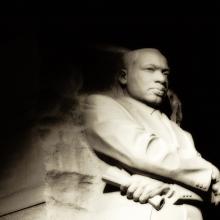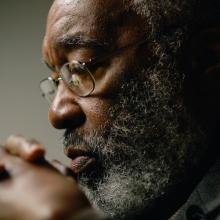Vincent Harding

Image via Johnny Silvercloud/Flickr
The 2016 U.S. presidential campaign, election, and aftermath provide some data with which to diagnose how America is measuring up — not only to her to her founding principles but, for American Christians, to our confession of Christ and the laws of God.
Vincent Gordon Harding and Rosemarie Freeney Harding: A Biographical Timeline
IN JANUARY 2012, I was driving in the flatlands of northern Indiana with historian and democracy activist Vincent G. Harding. I was Harding’s tour guide and chauffer for the week. As we drove he asked me what I hoped to happen at an upcoming meeting. “We’re open to whatever you feel inspired to share with us,” I responded. He replied, “Joanna, this is your community. I want to hear from you what is important in this conversation. You know better than I what your community needs to be discussing right now.”
This was the organizational formula Vincent Harding had been using for more than 50 years: Bring people together, remind them of the strength of their roots, listen to their wisdom, and connect them to a broader biblical and historical movement.
Harding, who died May 19, 2014, was a lifelong activist for the development of a compassionate, multireligious, multiracial democracy and a leading historian in the black-led freedom struggle in the U.S. Harding and his spouse, Rosemarie Freeney Harding, who died in 2004, had been colleagues of Martin Luther King Jr. and Coretta Scott King in the 1960s, and Vincent later became the first director of the Martin Luther King Jr. Center in Atlanta.
When historian, author, and longtime friend P. Sterling Stuckey heard about Harding’s death, he said he found it hard to believe because “Vincent was larger than life.” Harding’s effect on movements for justice in the U.S. was far-reaching. He was a convener of scholars, activists, artists, youth, and people of faith. He believed that transformation happened when everyone was engaged and contributing—and he believed that everyone had something to offer in the creation of a compassionate, multiracial democracy.
On June 2, 1964, while hundreds of Freedom Summer volunteers were still finishing their training in Oxford, Ohio, three civil rights workers went missing in Neshoba County, Miss.
Moses knew from his experience in Mississippi that James Chaney, Michael Schwerner, and Andrew Goodman, who had left the day before to investigate a church burning in Philadelphia, Miss., would never be found alive. Moses’ responsibility that evening was to tell the young recruits who planned to spend their summer registering voters in Mississippi that they could meet the same end.
What happened next surprised some. In small circles, the young volunteers sat and talked. Soon, they started singing.
ONE DAY, WHEN I was a student at Christ the King Elementary School in my hometown of Richland, Wash., the nuns gathered all the kids, two by two, and walked us outside to the parking lot. There sat a mobile van emblazoned with the logo of the Atomic Energy Commission and the words “Whole Body Scanner.”
One at a time, we were led into the van, where we laid on a white-sheathed table beneath a large, (scary), medical-looking machine. There was a whirring sound, and after a minute or two we were told to get up and make room for the next child. We weren’t told what the process was for, but it’s safe to assume that the government was interested in the effects of radiation on those of us who were “downwinders” from one of the nation’s largest nuclear complexes.
Richland was (and is) the bedroom community for the Hanford Nuclear Reservation. Hanford was built in the 1940s as part of the Manhattan Project, the massive wartime program that led to the atomic bombs dropped on Hiroshima and Nagasaki at the end of World War II. Hanford’s role was the production of plutonium for the world’s first nuclear weapon, the “test” bomb detonated in New Mexico a few weeks before Hiroshima, and for the bomb that destroyed Nagasaki three days later.
Those weapons were dropped 69 years ago, but the debate about their morality continues. It emerged again this spring when the two Missouri senators proposed renaming D.C.’s Union Station after Harry S. Truman, who authorized history’s only nuclear attack on people. One commenter in a related discussion wrote, “I have a problem with judging past cultures by today's standards. To end WWII we dropped bombs on cities filled with innocent civilians. By today's standards that would be condemned. Are you willing to say we should not have done that to end WWII?”
I SAT MY two boys down the night I got the call and heard the news. “Uncle Vincent has died and passed on,” I told 15-year-old Luke and 11-year-old Jack.
I could see the sadness in their faces. Vincent Harding had been like an uncle to them, an elder and mentor to me, a formative retreat leader for the Sojourners community, and one of the most insightful commentators and historians of the true meaning of the civil rights movement and Martin Luther King Jr.
Dr. Harding and Dr. King were friends. Vincent and his wife, Rosemarie, were part of the inner circle of the Southern freedom movement, and Harding wrote the historic speech that King delivered at Riverside Church in New York City on April 4, 1967, where he came out against the war in Vietnam and identified the “giant triplets” of racism, extreme materialism, and militarism.
That speech was perhaps King’s most provocative and prophetic address. It reflected King’s heart and mind, and went further than he had gone before in challenging foundational and systemic wrongs in U.S. life and history and not merely calling for racial integration. This King—particularly in his thinking and writing from 1964 and the passage of the Civil Rights Act until 1968, the year of his assassination—was a King perhaps best understood by his speechwriter that day, Vincent Harding.
That’s what Vincent always did for us all: asked us to go deeper into our faith.
Vincent Harding died on Monday. One of my most important and dearest mentors is gone; there are countless other people across America — indeed, around the world — who are feeling the same as me.
But he really hasn’t gone; his memory and presence will continue on with us in a “cloud of witnesses,” which is the most important thing Vincent ever taught me.
At the Illiff School of Theology in Denver — the last place he worked and taught — Vincent’s title was “Professor of Religion and Social Transformation.” That was apt for someone who spent his life teaching and showing how faith was meant to transform the world, beginning with our own lives.
The first time I met Vincent Harding was at a talk he gave at Eastern Mennonite University titled something like “The People Around Martin Luther King Jr.” We expected to hear about all the famous civil right leaders from the movement. Instead, he spoke of those who had gone before, often many years before King, who had shaped, inspired, and sustained him like a family tree, a community of faith, or “a cloud of witnesses.”
Dr. Vincent Harding, a theologian, historian, author, and civil right activist, died at 5:11 p.m. on Monday at the age of 82. Dr. Harding worked alongside Dr. Martin Luther King Jr., as friend, speechwriter, co-collaborator, and served as a mentor and advisor to many of the members of the Student Non-violent Coordination Committee.
Harding's social activism had deep spiritual roots in the Mennonite tradition and the Black church. Dr. Harding was one of the chroniclers of the civil rights movement as a participant, an historian, and social observer. He and his late wife Rosemarie were senior consultants to the "Eyes of the Prize" documentary film project.
Harding was a professor emeritus at the Iliff School of Theology and co-founder with his wife Rosemarie Freeney Harding of the Veterans of Hope Project, at the Center for the Study of Religion and Democratic Renewal at the Iliff School of Theology in Denver. He is also the author of numerous books, including Hope and History: Why We Must Share the Story of the Movement, There is a River: The Black Struggle for Freedom in America, and Martin Luther King: The Inconvenient Hero. Harding wrote King's famous 1967 "Beyond Vietnam" speech.
Jim Wallis, president of Sojourners and a friend of Harding, released this statement in response to Harding's death:
This is a great loss for our movement and the world and for all of us here at Sojourners. Vincent loved and served us so often in our history. He was an elder and mentor to me and to many of us. I am so grateful for a life so well lived. Thanks be to God for Vincent Harding. We are poorer for his passing and richer for having known him.
Driscoll appreciates strong males. He respects them.
As I understand it, in India where rural people live and work with elephants, they’ve come to learn things about elephant behavior. Like humans, elephant calves stay close to their mothers side longer than most other animals. When young male elephants are finally sent forth on their own, they sometimes form wild gangs that terrorize villagers with their rampages.
The villagers have learned that introducing a fully grown bull elephant into the gang of hoodlums mellows them out almost instantly. They thrive when there’s a large male around who they all know could kick their butts (that’s the paradigm that Driscoll operates out of). It’s not really about the potential to kick-ass. It’s that they respect a fully grown mature male and know that they can learn much about how to socialize from being around him. They learn patience, self-control, and they blossom into maturity.
I would submit that
we need to introduce the Christian equivalent of some bull elephants into Driscoll’s village where he is on a rampage.
 Flobots are a Denver-based, hip-hop/rock alternative group, whose powerful activist lyrics explore issues from globalization and poverty to war and peace. Their influences include civil rights activist (and Sojourners contributing editor) Vincent Harding, who has a cameo in their newest music video...
Flobots are a Denver-based, hip-hop/rock alternative group, whose powerful activist lyrics explore issues from globalization and poverty to war and peace. Their influences include civil rights activist (and Sojourners contributing editor) Vincent Harding, who has a cameo in their newest music video...
Yesterday morning, I started what would become an historic day with my favorite historian. As a young man, Vincent Harding was part of the inner circle of the southern freedom movement with Dr. Martin Luther King Jr., and later became one of the civil rights movement's best chroniclers and interpreters. Vincent has also been a mentor and trusted friend to me and to Sojourners for many years.
Vincent Harding was there at the Democratic Convention in 1964 when the party refused to seat [...]






